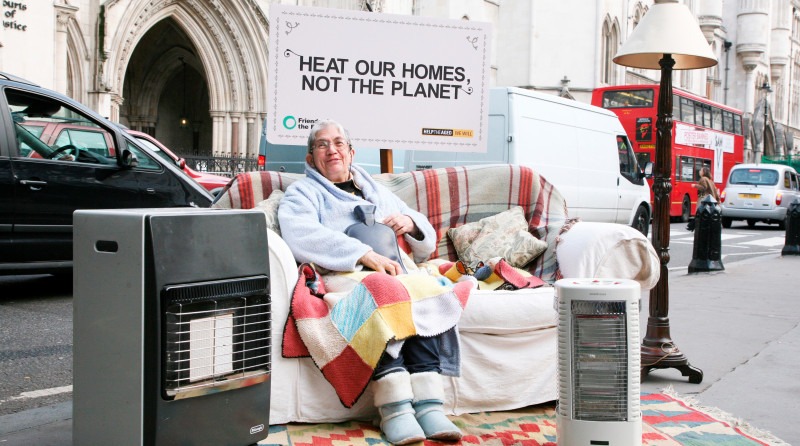Gains for energy efficiency offset by emissions trading for buildings that will raise energy bills
New energy legislation announced today by the European Commission is set to put energy-poor households in jeopardy, with unfair rises in Europeans’ energy bills, warn environmental and energy poverty groups.
The EU Commission’s ‘Fit for 55’ package of new energy legislation includes significant measures to strengthen energy efficiency laws to help tackle energy poverty. However these gains are offset by a proposal to extend the EU’s emissions trading scheme (ETS) to buildings and transport – a move that could push millions more Europeans into energy poverty, unable to pay their energy bills – risking lives and potential social backlash.
Freek Spinnewijn, FEANTSA, for the Right To Energy Coalition, reacted:
“We really hoped the European Commission would live up to its promise of a Green Deal that leaves no-one behind, but instead this package gives energy-poor people a punch on the nose. It’s one step forwards, two steps backwards. While there are some programmes for low-income people, it will overall leave them with higher energy bills or in the cold. That’s just wrong.”
Martha Myers, energy poverty campaigner for Friends of the Earth Europe said:
“This ‘Fit for 55’ package is unfit for the Just energy transition people and the planet desperately need – it will put energy poor people in jeopardy. Increased targets to cut energy waste will help reduce carbon – but not by enough to halt the climate crisis. The Commission’s move to extend emissions trading to buildings shows a lack of solidarity – it throws low-income people into high energy price waters while offering only a swimming float of support to relieve energy poverty.”
Energy efficiency
Friends of the Earth Europe and the Right To Energy Coalition welcome changes to raise and strengthen EU energy efficiency targets. The efficiency targets will now become binding rather than voluntary – but the targets at national level are only indicative leaving the goal difficult to enforce. The increased level of the target, set at 39% by 2030 is still too low to keep rising global temperatures below 1.5°C. The EU’s target of reducing emissions by 55% by 2030 does not represent urgency nor Europe’s fair share of climate action.
The text also takes encouraging steps to help target the scourge of energy poverty, with a new article to protect vulnerable consumers, a requirement to renovate public social housing and, significantly, a proportion of energy saving programmes will now be dedicated to energy poor households.
New Social Climate Fund
A new ‘Social Climate Fund’ aims to provide some funds for governments to support low-income households – in part to shield people from the effects of the ETS. This is recognition of the need to support energy-poor Europeans to access much needed renovations, renewables and transport schemes. However the amount of funding on the table will be insufficient to deliver that. It will also fail to offset the disastrous impact of the new ETS on energy bills.
ETS will raise energy bills
Unfortunately, these positive steps are counteracted by a ‘disaster in the making’ for low income Europeans who could see their energy bills skyrocket after the introduction of the EU emissions trading scheme (ETS) to buildings and transport in 2026. Energy bills are expected to go up by an average of €429 per year per European household as a result of including buildings in the ETS.
Apart from being unlikely to contribute significantly to CO2 reductions, this would put a disproportionate burden on people who are least responsible for the climate crisis and who can least afford to pay the additional cost – without any exemptions for the 50 million Europeans in energy poverty. The Commission’s impact assessment itself admits it “will not affect households equally, but would likely have a regressive impact”. While higher income households would more easily be able to afford the costs of energy-saving renovations and installation of renewable energy, it will be the poor who pay the price as they continue to be locked into fossil gas infrastructure.
Only 25% of the revenue from the new ETS to buildings will be ring fenced to support vulnerable households through the Social Climate fund, with Member States required to match this number.
Friends of the Earth Europe and the Right To Energy Coalition next call on the European Council and Parliament to scrap the new ETS to buildings, strengthen climate and energy efficiency targets, and ensure substantial funding for the Social Climate Fund to deliver renovations and renewables to low-income groups. The European Commission is expected to come forward with a new Energy Performance of Buildings Directive to tackle decrepit and inefficient buildings later this year.
Facts on energy efficiency and energy poverty
Energy poverty is at critical levels in the European Union, with the Covid-19 crisis only worsening impacts.
- Over 50 million Europeans cannot sufficiently light, heat or cool their homes, with inadequate housing linked to 100,000 premature deaths annually.
- The economic burden of inadequate housing amounts to over €194 billion per year in public health costs.
- In Europe, buildings account for around 40% of all energy consumed, and 36% of greenhouse gas emissions.
- More than seven out of ten buildings are energy inefficient.
- For every 1% increase in the energy efficiency targets, 7 million people can be lifted out of energy poverty.
Related Content
We think you’d also like:

European Green Deal
The European Green Deal has the potential to transform Europe’s economy to help fix the climate and ecological crises, and support workers in the transition. But it is in danger of being too little, too late.






